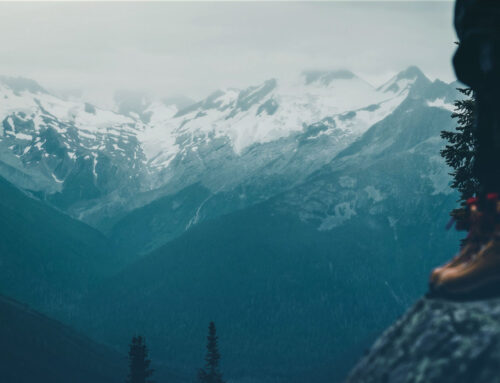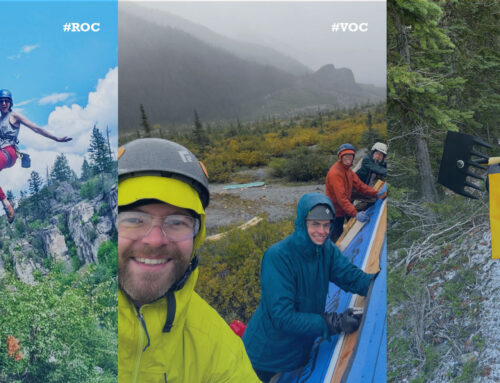Summer is finally here, and we know you’re itching to get out on the trails (but maybe not to see the recent influx of mosquitoes). You gather your friends and plan a trip to some of your favourite hiking or climbing spots, but soon realize you need a day-use pass – upon arrival to the park (how inconvenient!), or through talking to your friend who watched the news. Now what?
We’ve all seen the effects. Crowded or damaged facilities and trails. Packed parking lots. Overflowing garbage bins. Safety issues. Vehicles parked along the highway. We get it. We love our parks and want to protect them. But at the same time, we believe that more planning, research, and even budget could be allocated to BC Parks, especially during a pandemic, when we need our parks the most.
To help make your trip smoother when heading out on your next adventure in the outdoors, we’ve put together some tips and things to consider:
1. Six provincial parks require the passes, but not all trails
On July 27, the six busiest provincial parks in BC started to require visitors to go online to obtain a free day pass at discovercamping.ca before they may enter most trails. These parks include Cypress, Mount Seymour, Garibaldi, Golden Ears, Mount Robson, and Stawamus Chief.
Tip: Not all trails at these parks require day-use passes. Some trails exempt from the pass system on include the Skyline Crest, Forks, Trans Canada, and Yew Lake trails at Cypress Provincial Park, and the Baden-Powell Trail, Old Buck, Flora and Goldie trails at Seymour Provincial Park. View all trailheads that require a pass.
Do your research, not only of trails that are available, but knowing where to go and what to pack. Although a new trail may be exciting, some trails may not be well-marked or may require additional time to travel. For example, to hike up the Black Tusk in Garibaldi Park can be about a 10-hour day. Seek resources or someone knowledgeable about the trail, if possible. Planning accordingly can reduce possible search and rescue calls.
For those trails that require a day-use pass, you can select a morning or afternoon pass, depending on what time you plan to arrive. However, each day park pass only becomes available after 6 a.m. on the same day. (we know, backcountry hiking requires ample planning, and this provides limited time to plan or arrange travel with others!).
The FMCBC has concerns that recreational groups were not consulted – before these pilot project passes were implemented. The input of these groups would help to provide improved options, such as allowing backcountry hikers to book passes in advance. We’re hoping that since this is a only pilot project that the pandemic plan can be adjusted, and the public will be consulted.
2. Book a backcountry camping permit to secure your spot
If you have extra time or are looking at a longer trip, consider getting a camping permit. Backcountry campers with permits are not required to reserve a day-use pass. Just carry proof of your camping permit (printed or via your mobile device) when out on one of the select trails that require a pass.
A Park operator staff will be checking passes upon arrival, although the BC Parks system is currently underfunded and has limited staff.
The FMCBC met with BC Parks in June to discuss one-way directional trails at select parks to avoid expensive gatekeepers where possible and to allow for physical distancing. For example, Mount Seymour and Black Mountain hikers could go up the hiking trail and down the ski run, or hikers on the Squamish Chief trail could go up to the second peak and down the backside gulley to Olsen Creek.
What do you think about one-way trails to help practice physical distancing? Tell us in the comments.
3. Limits to people on trails and vehicles in parking lots
Be aware of not only trails with people limits, but parking lots with capacity limits at parks. For instance, some parking lots have a limit of 50 vehicles, so even if you could possibly get a pass, you’ll need to consider parking capacity limits too.
If travelling with others, consider carpooling (with physical distancing in place) to reduce your impact and ensure you find a spot. Remember not to share food containers or water packs.
4. Same day delivery
In many cases, same day delivery can be quite convenient. However, when it comes to planning and packing your gear for a backcountry hiking trip, this definitely is not convenient to get your pass the same day as you book it. To ensure a safe backcountry trip, we often need to leave at a certain time to arrive back safely before daylight subsides. Temperatures change. Wildlife appears. Etc.
With the BC Parks day-use system, you’ll need to reserve your groups’ passes (up to eight people) on the day that you head on your trip. However, there may be delays for staff to process or check the pass. The pass system provides barriers to those longer trips for hikers at backcountry paradises; they require additional time and preparation. In these cases, check if those backcountry camping permits are available to allow extra time to plan and to leave on schedule. You can register two weeks in advance.
5. The passes are part of a pilot project, so may be temporary
It’s clear that there was no time invested to research or consult with recreation groups before the day-use passes were implemented. Additionally, the resources, including staff time and budget, needed to implement enhancements or protections in parks during the pandemic were not included. Thus, parks staff or contractors, who are currently monitoring passes, have obviously been reallocated away from trail maintenance or other park operations priorities.
Although the passes are a pilot project, the FMCBC has concerns that the free passes may turn into “pay per usage” passes. Additionally, BC Parks has not consulted with recreation groups to develop a plan. Consequently, people who need to get outside and connect with nature – for their mental and physical health during the pandemic – will be limited.
We welcome your thoughts on the current day-use pass system. What’s working? What’s not? Do you have other possible feasible solutions? Since the passes are temporarily part of a pilot project, we encourage you to comment below, send us your thoughts at fmcbc@mountainclubs.org, and to contact your local MLA to request to properly fund BC Parks and work with the public for viable solutions to connect with nature. Let’s get back to our parks – in a safe, yet environmentally-friendly way!
About Us
The Federation of Mountain Clubs of BC advocates for and supports enhanced access to trails and non-motorized recreation in BC. Help support our efforts and become a member, join a Committee, or make a donation today.





First off I do not think the day pass system to control overcrowding had much to do with Covid 19. It is not that difficult to maintain 6 ft of space between hikers on even the busiest of trails. It seems to me like Covid19 was a convenient excuse to initiate this poorly thought out reactionary measure without consultation with interested parties. Using the resources to improve access to less popular trails and to maintain infrastructure would be a much better strategy to meet the needs for outdoor recreation for the growing population in the lower mainland.
Thanks for the comment, Jayne. We agree that the pandemic made it convenient to launch the day-use passes, but there are other underlying reasons. The FMCBC is concerned that this pilot project will become permanent, or even a ‘pay per use’ pass.
We are sending input to the BC government on the pass system and providing other alternate suggestions. You’ll notice in our article that we also agree that the funding should go towards enhancing access to and improving trails. Read it here: https://mountainclubs.org/a-review-of-the-day-use-pass-system-at-bc-parks-from-the-fmcbc/
The last minute trail booking system doesn’t allow much time to inform an emergency contact where you are going for the day either. I recommend forwarding the reservation confirmation email (if you get it right way – the contractors are having issues with the email system) to your emergency contact with a planned return time and when they should call the RCMP to call-out search and rescue.
I usually allow a couple hours after my conservative planned return time. It would be nice to have the RCMP to check my car to see if it is broken down at a location that doesn’t have cell service. I don’t like the Adventure Smart app myself but they have some good ideas on their website about being prepared and informing one or more responsible persons about your destination,
Just another example of government bureaucrats trying to justify their jobs and pensions by creatively coming up with something new to restrict to look like they are doing something useful. And it won’t be long before free passes become pay-per-use fee passes you can count on it. You see that phenomenon at the National Parks too. Somehow restricting provincial parks is useful to prevent COVID spread but allowing people to pack Kitsilano Beach and Wreck Beach is OK.
I am appalled. World way too crowded. A permit to go for a walk in nature? what’s next, pay for the right to breathe or else purchase canned air? I guess, sadly we already pay for canned water. Access to Nature getting commoditized. No seriously, I just went for a traverse in a BC park, did not see a soul for 3 days. The resources available to BC parks are scant and getting scarcer yet. One can see it in the disgraceful lack of trail maintenance, some beautiful trails have become nearly unusable, hence folks funnel into those that are. Now those scant resources are being used not to protect and maintain resources like surveillance for poaching and to keep parks accessible, but rather pay for burocracy aiming to make parks LESS accessible. Stop the world, I want to climb off.
This policy really makes no sense. I can hang out in English Bay without booking a “day pass”, but I can’t go for an evening ramble up Cypress Mountain.
Speak out! – Contact: George Heyman – Minister of Environment and Climate Strategy.
The gate keeper wages could be better spent elsewhere (facilities, parking and trails).
Speak out!!!
Sounds confusing to me. What happened to spontaneity?
I don’t believe this is necessary, and will cost money that could be spent on something more useful for our parks system.
I am happy I live in the interior now, and do not have to deal with this. I hope they drop it as soon as Covid is under control
Mary Barquest
Kamloops, B.C.